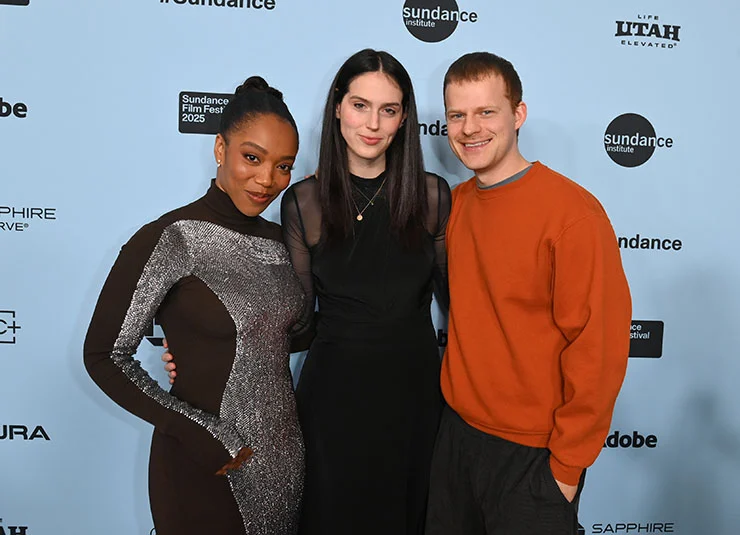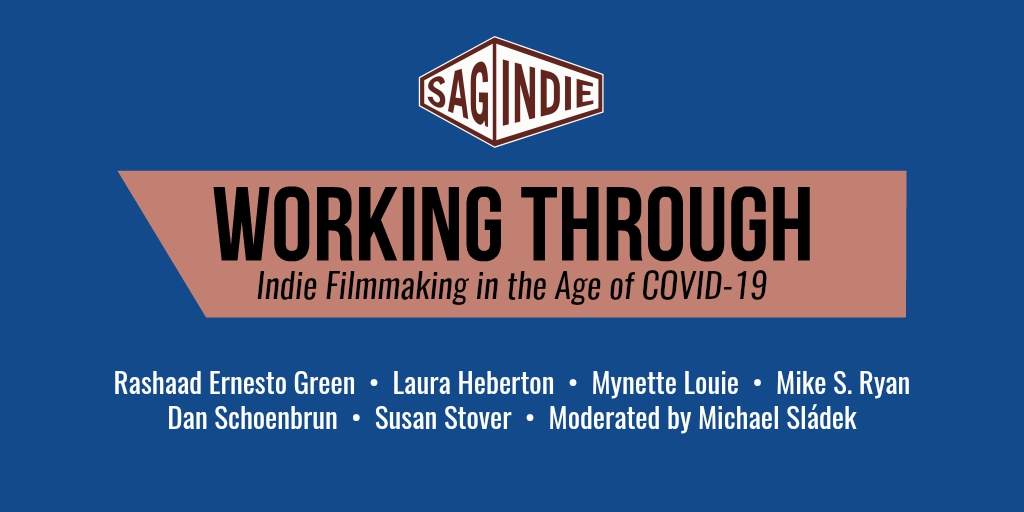A fresh comic voice, EVA VICTOR emerged as a writer and humorist, gaining Twitter virality before eventually landing acting roles on Showtime’s Billions and in Jonah Feingold’s indie feature Dating & New York. When crafting SORRY, BABY — Victor’s film debut as screenwriter, director, and lead actor — they found themself some impressive collaborators. Barry Jenkins, a fan of Victor’s comedy, signed on to produce the film alongside his Moonlight and Aftersun producers Adele Romanski and Mark Ceryak. Victor had a Director of Photography in Mia Cioffi Henry, the Head of Cinematography for NYU’s Tisch School of the Arts’ graduate film program. And the film’s enviable résumés extended to the cast that Victor brought on as well.
NAOMI ACKIE first came to moviegoing attention in William Oldroyd’s Lady Macbeth, winning Most Promising Newcomer at the 2017 British Independent Film Awards. She co-starred in Star Wars: The Rise of Skywalker, before leading such films as Kasi Lemmons’ Whitney Houston: I Wanna Dance with Somebody, Zoë Kravitz’s Blink Twice, and Bong Joon Ho’s Mickey 17.
And LUCAS HEDGES — Oscar-nominated for his breakout role in Manchester by the Sea — has worked with some of cinema’s modern auteurs, including Wes Anderson (Moonrise Kingdom and The Grand Budapest Hotel), Terry Gilliam (The Zero Theorem), Greta Gerwig (Lady Bird), Martin McDonagh (Three Billboards Outside Ebbing, Missouri), and Steven Soderbergh (Let Them All Talk).
These three performers come together in Sorry, Baby, a dramedy about five years in the life of Agnes (Victor), a young academic navigating life and trauma in small-town Massachusetts. Ackie portrays Agnes’s best friend Lydie, with Hedges as potential love interest Gavin. The film premiered at the 2025 Sundance Film Festival, where Victor took home the Waldo Salt Screenwriting Award. Sorry, Baby continued on a successful festival run, including the Independent Film Festival Boston, Seattle International Film Festival, Sydney Film Festival, and Cannes Directors’ Fortnight.
A24 will release Sorry, Baby in select theaters on June 27, before going nationwide on July 18. We were lucky enough to have a conversation with the film’s writer/director/star Eva Victor and actors Lucas Hedges and Naomi Ackie about their experiences making the film.
__
COLIN McCORMACK: Eva, from what I understand, you were a bit hesitant to take on the directing role at first. Looking back, how did the actual experience on the film compare to those initial reservations?
EVA VICTOR: I really loved directing the film and felt very in my purpose doing it. I didn’t always know what I was doing, but there was never a moment when I regretted doing it. We live in a world where some people are allowed to try it from the get-go and see what happens. Then a lot of us are raised without even the desire to direct, because we don’t really know what it means, and we’re never given a chance to do it. So, I think it took a bit of time for me to figure out exactly what the job was, and then to realize that I actually do feel prepared to do it. I did love it and felt it was very, very meaningful. And I got to direct some of the best actors in the entire world.
CM: What was it about Naomi and Lucas that made them perfect for the roles of Lydie and Gavin?
EV: The second I met Naomi, I knew that she was basically made of the heavens, and I desperately wanted her to do the movie. We read together, and the chemistry was off the charts, if I’m being honest. Beyond that, she’s so warm and funny, and she gave all of herself to the project, and she moved with such kindness. Also, she’s just a brilliant actor. She can do anything. Legitimately, anything. I’d seen Lady Macbeth and The End of the Fucking World, and then I saw Blink Twice and Mickey 17 and Whitney Houston. This fucking person! I honestly do not know how she can do everything, but she genuinely can. So, the fact that she did this and was so funny and had such naturalism is such a miracle.
And then Lucas, honestly, he’s a legend. I’d known about him forever because he is a part of our culture. We grew up with him. I was in high school watching him be in high school. He is part of some of the most epic films that we’ve ever seen, and some of the most important films for women. So I’m kind of like, By the way, I completely freaked it.
CM: Naomi and Lucas, you’ve both worked with some extremely seasoned filmmakers. Do you have to let it be known to your teams that you are still open to working with first-time filmmakers and new voices?
NAOMI ACKIE: That’s a great question. You know what? My team is incredible, and they have really encouraged me working with a variety of artists and filmmakers. And it’s something that I’ve always championed within myself because I’ve always wanted to stretch different muscles. I think there’s something incredible about working with someone who’s been working for 20 years, and there’s something incredible about working with someone on their first project. So I never had to say anything because my team and I have an understanding of what I’m about and what I want to look for.
LUCAS HEDGES: I feel like first-time filmmakers can sometimes be the most fun people to work with. At least, I’ve had really great experiences with first-time filmmakers, like Greta and some others. But this script itself read like somebody who knew what they wanted. It didn’t feel like, I’m going to go do this student film. This was an advanced piece of work. I’m really just looking for great material, that’s all.
CM: You mentioned Greta, Lucas. You and Naomi both, I noticed, have worked with a lot of directors who are also actors or former actors. [Hedges has been directed by Gerwig, Tim Blake Nelson, Jonah Hill, and Joel Edgerton; Ackie by Kasi Lemmons, Zoë Kravitz, Aziz Ansari, and Idris Elba.] Is there a common trait that you’ve noticed working with directors who have that same experience on your side of the camera?
LH: Oh, yes. I think there’s an inherent empathy and compassion and an understanding of, I’ve been in your shoes. I know what you’re going through. And then also a delight in their fellow actors. Actor-directors love actors. So, there’s just generally more excitement. Sometimes, directors can be kind of sterile and a little bit alien on the set. And this was the opposite. It was like when a parent joins in with the kids, like, “Put your hands in the paint and we’ll all do it together.”
NA: The word that came to me was “perceptive.” I think there’s something so instinctive that you have to encourage in yourself when you’re an actor. When an actor becomes a director, they’re working off of instinct and energy and emotion, then they’re incorporating the technical side on top of that. But the core of it, knowing the lives of that character and maybe even splitting their brain into all of those different characters to create the story, is extremely special. I totally agree, it’s that love of performers and actors.
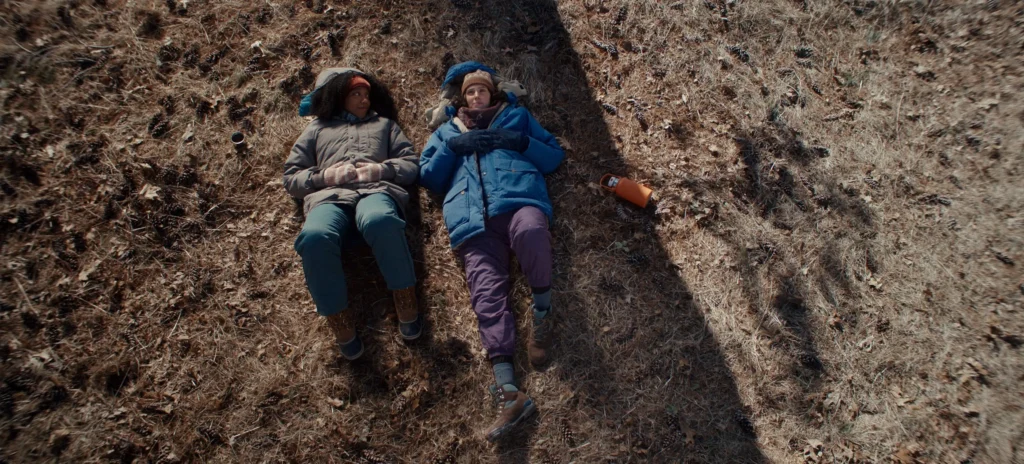
CM: On Sorry, Baby, were you all able to have any rehearsal time or spend significant time together before the filming began?
LH: Eva and I got sushi together before filming.
EV: Naomi and I hung out for a couple of days, just chilling. Lucas and I Zoomed. It was pretty chill. I cast them because they were awesome, and there was no preparation for them beyond wanting them to feel comfortable with me.
CM: There are some really vulnerable and intimate scenes that you each portray in the film. Eva, how did you figure out the best path to take when directing those more delicate moments?
EV: Things were heavy for different reasons in different scenes. The bathtub scene was one where I didn’t leave the bathtub; I just stayed in there, and Naomi and I just kept going. It didn’t feel like my job as much to be behind the monitor, more to trust that we were getting what we needed to get. It was a pretty simple shot. There were some intimacy scenes, and we had an intimacy coordinator. It was wonderful, especially because, being the director and an actor, there is an inherent power imbalance with Lucas. I wanted him to have someone to talk to because I knew what I wanted in a couple of ways, and I wanted to make sure he was comfortable. We also had a mental health coordinator on set who was there for the particularly hard days. It was definitely a collaboration in making sure everyone had everything they needed.
CM: Was that each of your first times working with an intimacy coordinator?
LH: I’d done it once before; this is the second time. This was kind of epic because she gave us theater exercises to do. It almost felt like we had a theater teacher there.
EV: That’s true. And she gave me breathing exercises for my panic attack [scene].
LH: We were even choreographing the scenes. We didn’t end up using it, but I had choreo that she gave me for the sex scenes.
EV: Yeah, she gave me exercises to make it sound like I was having an orgasm.
LH: That’s what I was working on too.
NA: How does it go?
EV: It’s all about breath. It’s not about making any sort of sound, it’s about breathing at the right pace. She would say, “Make a sound like you’re throwing a ball.”
LH: Or, “you’re dropping a heavy weight.”
NA: Oh, then it separates it from doing a sexual act.
EV: Exactly. It was really helpful.
CM: I’ve not heard of having a mental health professional on a set before. Did you experience that on another set, or did you just think, given the material, that would be the best path forward?
EV: I think it was one of my producers’ ideas to have her there. She was there for a few days, and it was kind of like having a kindergarten teacher there. Obviously, in a nice way. She gave us little toys, like fidget spinners, that would help with anxiety. And then she would have these sour candies around to help us. If you ever start feeling an anxiety attack coming on, sour candy is very grounding. She had all these tools to help us through hard times.
CM: Eva, I’m always curious when a director is also acting in the film, what’s the post-production experience like for you, having to work in the edit and choose your best takes, and put on the different hats? How do you not let vanity take over?
EV: Vanity, yes. Honestly, it was really hard. I basically experienced ego death. Thinking, Who am I? What is the point? What did I do? It was really emotional to watch the film because I had to spend a couple of weeks trying not to judge myself for what I looked like. Once I got over that, because we had to make the movie, there was a time when I remember it clicking, That’s not me. It was like another person on the screen, and it’s easy not to make a choice that’s vain when it’s very clear that another thing would be better. It’s all about, What does the movie need? Not, What do I need? And then I dyed my eyebrows and my hair so that I could look different. That actually did help.
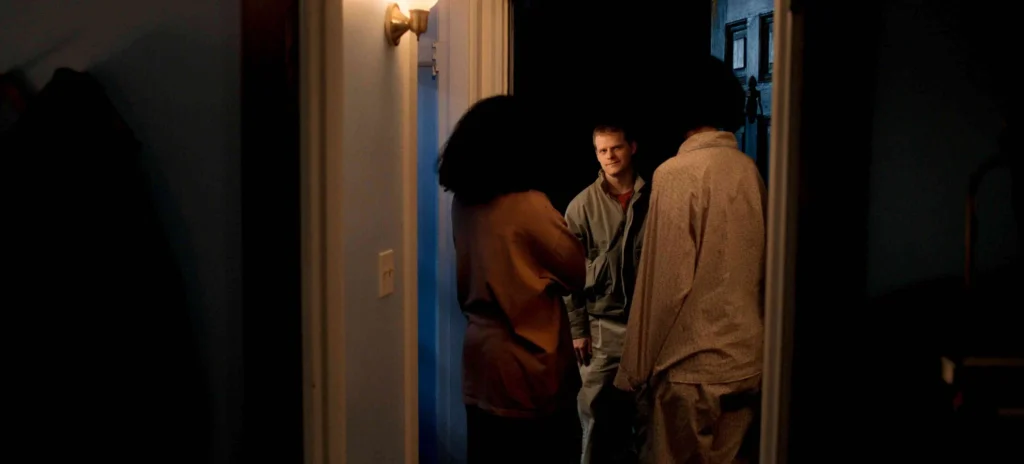
CM: There’s the saying that you make three films: The one you wrote, the one you directed, and the one you edited. But there’s also the one that you promote. The three of you only share screentime very briefly in the film. What has it been like to reunite and screen the film for audiences around the world?
EV: Honestly, it’s weird. The real fantasy is that people go into the theater and see the movie, and then you can talk about it afterwards. But that’s not the way the world works. It’s interesting promoting the film because the creative part is over. It’s all about inviting people to see the film in the way that feels the most honest. But it is really nice to be reunited after all this time, seeing Naomi and Lucas together. We kind of reunited yesterday, and it’s bringing back all these memories of how nice it was on set and how much time has passed since then. I mean, it’s called a release for a reason. You gotta release that shit.
LH: Fuck yes.
CM: What were some lessons that, coming off of your debut, you’ll take with you to your next project?
EV: Finding ways to take care of myself through it, because I don’t think I understood how long the journey would be. Obviously, it’s a blessing that the journey is still going on, but when we wrapped, I was like, “Hell fucking yeah, it’s over!” And then I was like, Oh my God, I didn’t even know the actual movie needed to be created. So I think finding ways to take breaks and preserve the mind and the body throughout is something I would have my eye on a bit more, now that I understand what the full job is. I also think trusting myself [is important]. If there’s a reason why I think something should be what it is, I have to figure out why I think that. Don’t just dismiss it because you don’t know why yet.
CM: Lucas and Naomi, any specific memories you’ll take with you from this experience?
NA: My main memory is a lot of laughter.
EV: Yay!
NA: Considering the subject matter, I really love it when that happens. There was a lot of joy on set because everyone was there to tell this story because they really loved it, and they loved Eva. There are a lot of memories of corpsing. So many moments were just hilarious. Those things were so welcome in the space, even though we were working through a time limit.
EV: We had to have so much fun.
NA: We had so much fun.
EV: Remember the doctor scene? We couldn’t stop laughing.
NA: There were so many times where we caught the giggles and it helped us.
LH: I’ve said this before, but a few months after we finished, Eva came to me in a dream and was helping me learn the lessons I learned from filming this for my next job. One of the things Eva said to me while filming was just to do it wrong. Do it at 110%. And that was the take we used. I feel like that is what Eva was telling me in my dream as well: “No matter what you do, commit all the way. Go for it 110%.”
CM: Naomi and Lucas, has this experience made either of you think that directing might be in your future?
EV: This is a fucking sign!
LH: Oh, trust.
EV: The way I feel about them directing is legitimately intense.
NA: It’s a twofold thing because now I’ve seen Eva direct and Zoë direct, and I’ve seen it be a really big growth moment. But it also looks terrifying.
EV: It’s time. If anyone can fucking do it, it’s you.
NA: I do hope, one day.
EV: One day soon. Lucas?
LH: You just have to have the right thing to do, the right story. Because like you just said, you make four fucking films! It’s hardly worth it to make the right film because of how much it takes.
NA: It’s a big cost on life.
LH: As an actor, we just get to hitch a ride.
NA: Yeah, we come in right at the end.
LH: Maybe I’m being too precious, but I’ll definitely get there. I need the protection of the piece being right. Whether that’s perfectionism or unhealthy or self-sabotage, we’ll find that out soon.
EV: We’ll find that out as a group!
LH: We’ll figure it out and we’ll tell you about it.
EV: By the way, it’s not a coincidence that these were the two people I was desperate to work with. Then, after casting them, I find out they’re both incredible writers. That’s an artist through and through.
CM: What’s up next for you all?
LH: Good question. My friend and I are making a short. We’re just improvising it. There’s this amazing short that I love on YouTube called Rap World that these comedians made over the course of a year. They’d get together on weekends and improvise it. I found it really inspiring. I like creating something with no expectations; it’s just for fun. Ideally, you want that to be your first film, something just for you. To go from zero to 60 without the experience of making something just for yourself, you want to know what it feels like just saying what you want to say.
NA: I’m writing at the moment, so that’s taking up a lot of my time right now. Hopefully, soon I’ll be doing something about that.
EV: I’m looking forward to getting back into the private zone of working on something and having the door closed. Just me and the page again.
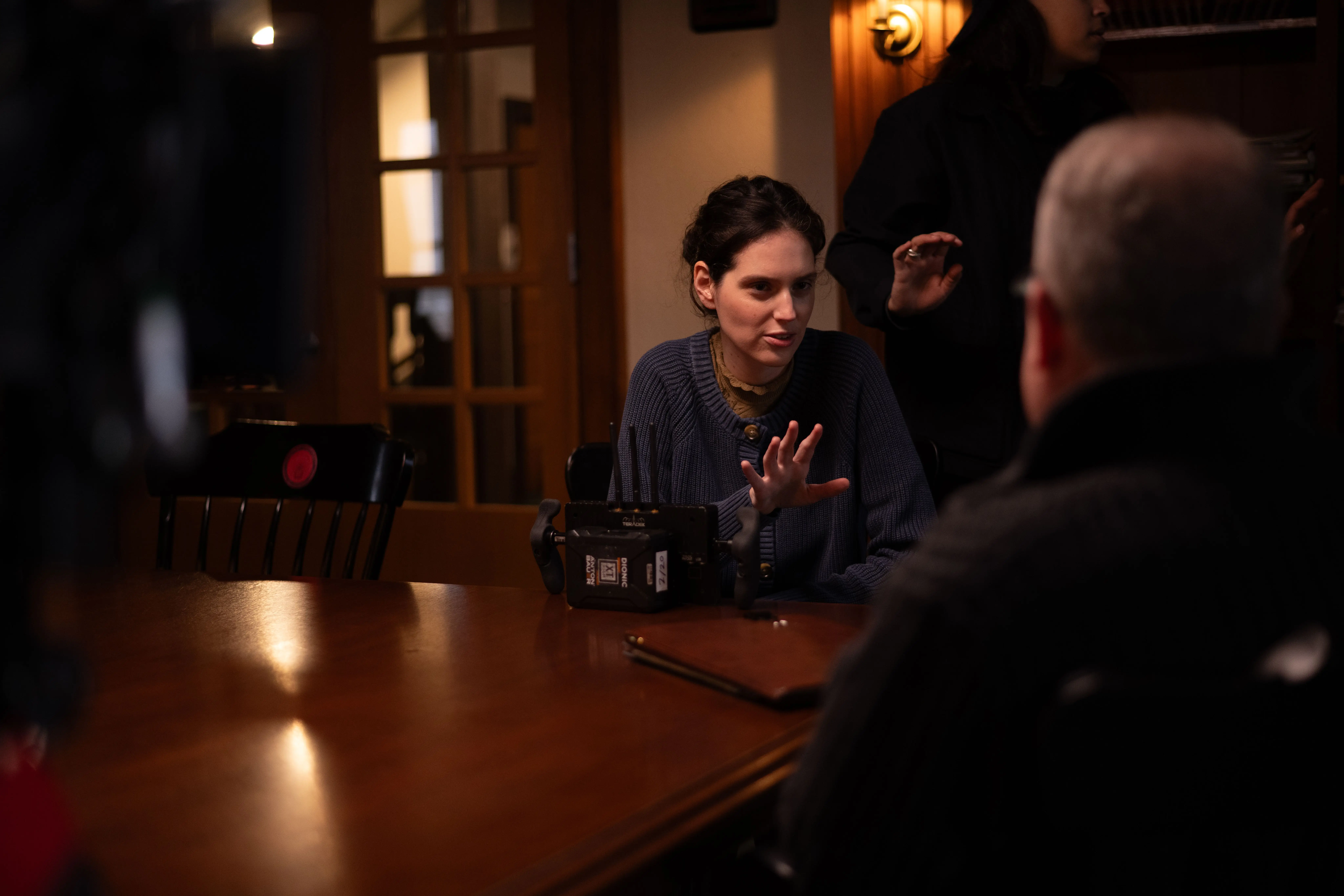
__
Thanks to Eva, Naomi, and Lucas for talking to us about SORRY, BABY. Learn more about the film at the A24 website.
This interview has been edited for clarity.
If you’re an independent filmmaker or know of an independent film-related topic we should write about, email blogadmin@sagindie.org for consideration.

